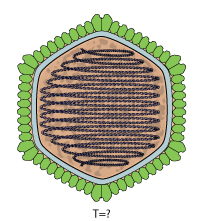
Portogloboviridae
| Portogloboviridae | |
|---|---|

| |
| Portoglobovirus virion | |
| Virus classification | |
| (unranked): | Virus |
| Realm: | Varidnaviria (?) |
| Family: | Portogloboviridae |
Portogloboviridae is a family of dsDNA viruses that infect archaea. It is a proposed family of the realm Varidnaviria, but ICTV officially puts it as incertae sedis virus. Viruses in the family are related to Helvetiavirae. The capsid proteins of these viruses and their characteristics are of evolutionary importance for the origin of the other Varidnaviria viruses since they seem to retain primordial characters.[1]

Description
The virions in this family have a capsid with icosahedral geometry and a viral envelope that protects the genetic material. The diameter is 83 to 87 nanometers. The genome is circular dsDNA with a length of 20,222 base pairs. The genome contains 45 open reading frames (ORFs), which are closely arranged and occupy 89.1% of the genome. ORFs are generally short, with an average length of 103 codons. Virions have 10 proteins ranging from 20 to 32 kDa. Of these proteins, 8 code for the capsid and two for the viral envelope, including one that is a vertical single jelly roll (SJR) capsid protein. Entry into the host cell is by penetration. Viral replication occurs by chronic infection without a lytic cycle.[2]

The Portogloboviridae viruses together with Halopanivirales have evolutionary importance in the evolution of the other Varidnaviria viruses since they appear to be relics of how the first viruses of this realm were. Portogloboviridae together with Halopanivirales may have infected the last universal common ancestor (LUCA) and originated before that organism.[1]

It has been proposed that it may be related to the origin of Varidnaviria in the following way.[1]

| Varidnaviria |
| ||||||
Taxonomy
The family has one genus which has two species:[3]

- Alphaportoglobovirus
| Name | Name | Abbr | GenBank | REFSEQ |
|---|---|---|---|---|
| Alphaportoglobovirus SPV2 | Sulfolobus polyhedral virus 2 | SPV2 | MK064567 | NC_055116 |
| Sulfolobus alphaportoglobovirus 1 | Sulfolobus polyhedral virus 1 | SPV1 | KY780159 | NC_038017 |
References
- ^ a b c Krupovic M, Dolja VV, Koonin EV (14 July 2020). "The LUCA and its complex virome". Nat Rev Microbiol. 18 (11): 661–670. doi:10.1038/s41579-020-0408-x. PMID 32665595. S2CID 220516514. Retrieved 22 October 2020.
- ^ Liu Y, Ishino S, Ishino Y, Pehau-Arnaudet G, Krupovic M, Prangishvili D (9 July 2017). "A Novel Type of Polyhedral Viruses Infecting Hyperthermophilic Archaea". J Virol. 91 (13): e00589-17. doi:10.1128/JVI.00589-17. PMC 5469268. PMID 28424284.
- ^ "Virus Taxonomy: 2022 Release". International Committee on Taxonomy of Viruses (ICTV). March 2023. Retrieved 20 August 2023.
See what we do next...
OR
By submitting your email or phone number, you're giving mschf permission to send you email and/or recurring marketing texts. Data rates may apply. Text stop to cancel, help for help.
Success: You're subscribed now !
